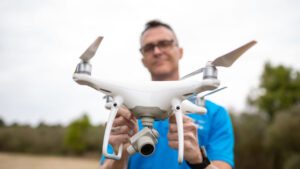
A three-judge panel of the 4th U.S. Circuit Court of Appeals has ruled that North Carolina can prohibit the creation of aerial maps by anyone other than licensed land surveyors. This decision affects Michael Jones, a drone operator based in Goldsboro, North Carolina, as well as other entrepreneurs in the state. Jones, along with the Institute for Justice (IJ), plans to seek further appellate review to restore his right to provide aerial mapping services without government interference.
North Carolina’s land-surveying board has been targeting small drone operators, claiming their maps and models constitute illegal “surveying.” Unlike many other states, North Carolina classifies even basic aerial mapping as “surveying,” requiring a full surveyor’s license. This license demands years of education and experience. The surveying board has enforced this law strictly, threatening drone companies with civil and criminal penalties.
Jones, an FAA-licensed drone operator and photographer, aimed to start an aerial-mapping business to offer landowners a bird’s-eye view of their property, useful in situations where a full land survey is unnecessary. However, in 2019, the surveying board issued a cease-and-desist letter to Jones, demanding he stop his mapping operations or face severe penalties.
IJ Attorney James Knight stated, “The court’s decision today injects uncertainty into a basic question of First Amendment law: How do we determine when speech is speech? Today’s ruling says that the state can criminalize sharing certain types of photos without a government-issued license. And it does so on the theory that such a law somehow does not regulate ‘speech.’ The ruling is badly flawed: Photographs are speech.”
Jones sued the board, arguing that creating and sharing visual information about land is free speech protected by the Constitution. The Fourth Circuit, however, determined that Jones’s actions do not constitute speech, but rather “conduct” that falls under the surveying profession. The court also reasoned that because Jones’s activities take place on private property, the government has more leeway to regulate them than if they occurred on public land.
The decision allows North Carolina to enforce its law without considering its impact on free speech rights, putting Jones and other drone photographers at risk.
“Drone technology may be new, but the principles at stake in Michael’s case are as old as the nation itself,” said IJ Senior Attorney Sam Gedge. “Taking photos and providing information to willing clients is speech, and it’s fully protected by the First Amendment. Only by badly misapplying the First Amendment could the Fourth Circuit hold differently.”
Jones and his company, 360 Virtual Drone Services LLC, will seek further review, either from the full Fourth Circuit or the U.S. Supreme Court.
“When the surveying board first told me that I was breaking the law, I could hardly believe it,” said Jones. “I didn’t think that I was doing anything that could be considered surveying. In fact, I don’t know of any surveying company that was using drones like I was. I’m looking to keeping up the fight and getting justice, not just for myself, but for other drone operators across North Carolina.”
The Institute for Justice defends First Amendment rights and economic liberty nationwide. In December 2020, IJ successfully defended a Mississippi mapping company similarly charged with unlicensed practice. IJ has also won appeals court decisions in free speech cases for a veterinarian in Texas and tour guides in Charleston, South Carolina. Find more information on the case here.
Read more:
- Is Drone Mapping a First Amendment Right? This NC Lawsuit Has Major Implications for the Commercial Drone Industry
- Surveyors Wanted to Shut this Drone Photographer Down. Now, He’s Fighting Back. [VIDEO]
- Drone Surveillance Case Goes to Michigan Supreme Court
Miriam McNabb is the Editor-in-Chief of DRONELIFE and CEO of JobForDrones, a professional drone services marketplace, and a fascinated observer of the emerging drone industry and the regulatory environment for drones. Miriam has penned over 3,000 articles focused on the commercial drone space and is an international speaker and recognized figure in the industry. Miriam has a degree from the University of Chicago and over 20 years of experience in high tech sales and marketing for new technologies.
For drone industry consulting or writing, Email Miriam.
TWITTER:@spaldingbarker
Subscribe to DroneLife here.